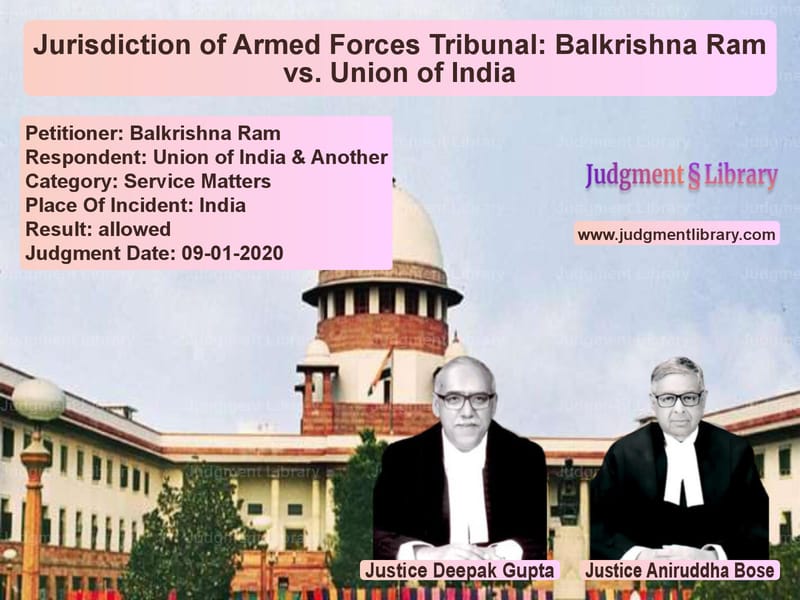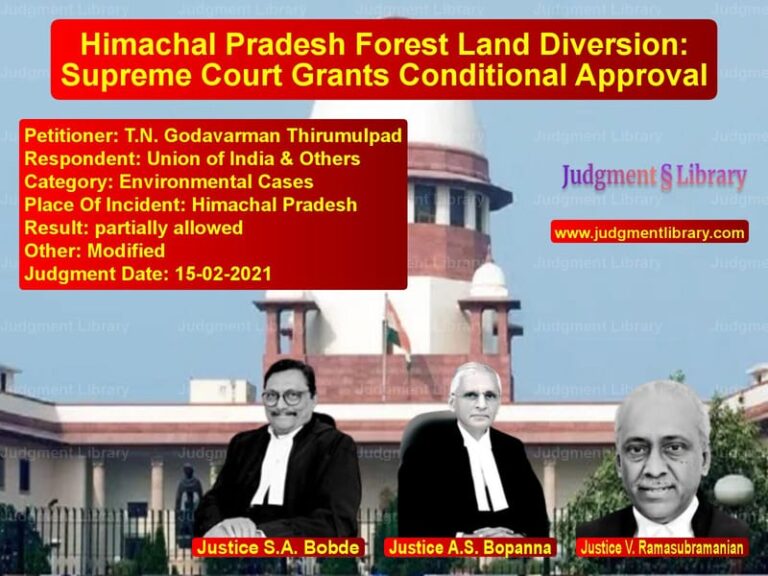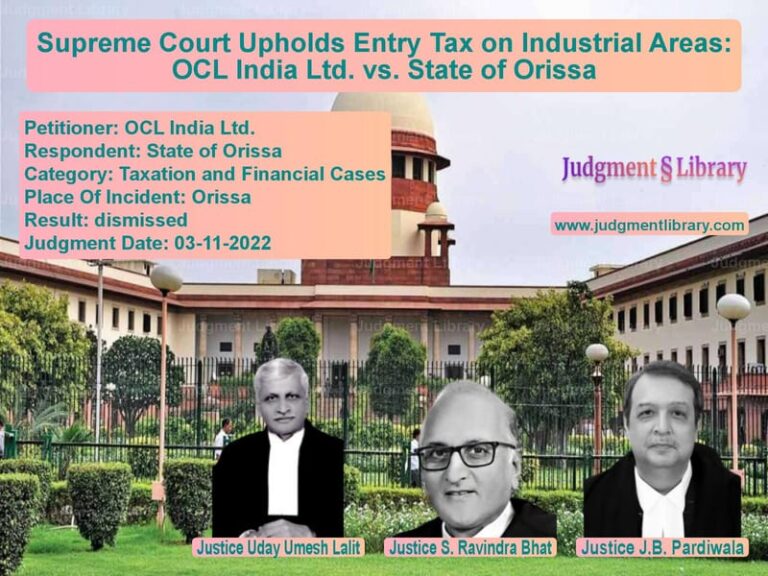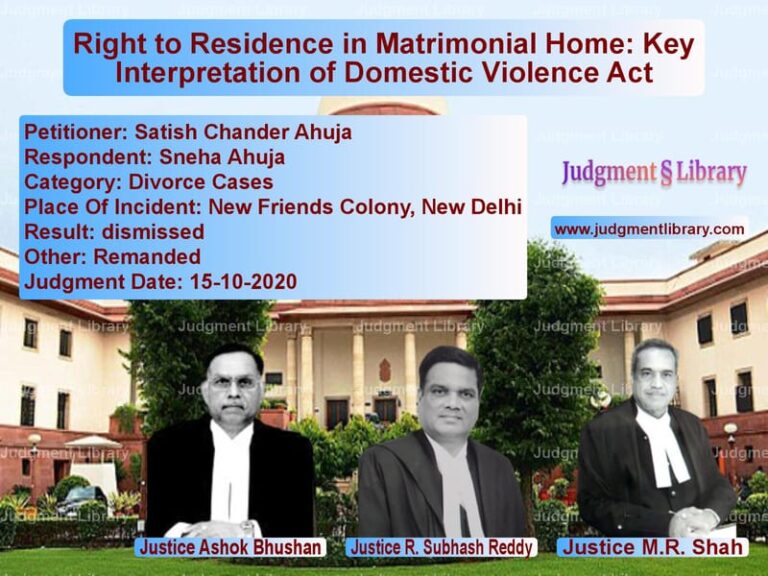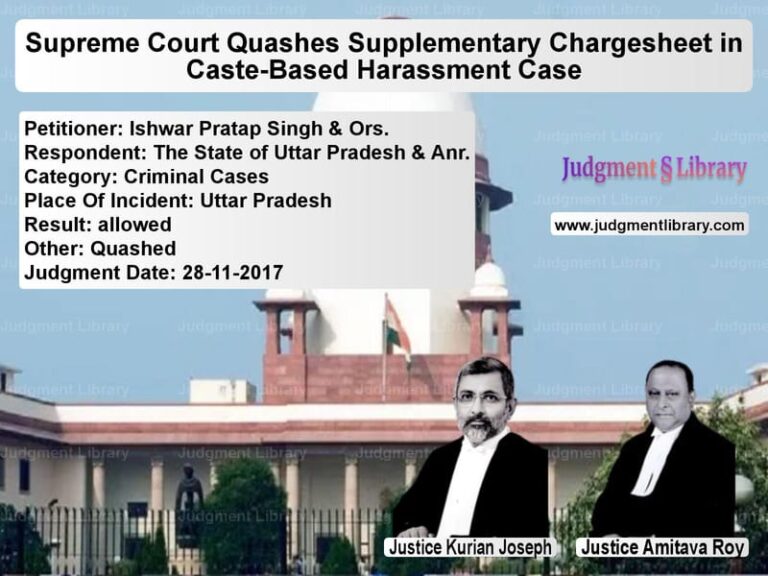Jurisdiction of Armed Forces Tribunal: Balkrishna Ram vs. Union of India
The case of Balkrishna Ram vs. Union of India revolves around the question of whether an appeal pending before a High Court concerning an armed forces personnel should be transferred to the Armed Forces Tribunal (AFT) or continue in the High Court. The Supreme Court was called upon to interpret the Armed Forces Tribunal Act, 2007 and determine the limits of the AFT’s jurisdiction.
Background of the Case
Balkrishna Ram, a member of the Indian Armed Forces, had challenged an order affecting his service conditions before a Single Judge Bench of the High Court. The matter was later appealed before a Division Bench of the High Court.
With the enactment of the Armed Forces Tribunal Act, 2007, the government established the AFT to adjudicate disputes related to service matters and court-martial decisions. The respondents (Union of India) contended that since the AFT had been established, all pending matters, including intra-court appeals in High Courts, should be transferred to the AFT.
The appellant argued that the High Court retained its constitutional jurisdiction under Articles 226 and 227 of the Constitution and that appeals within the High Court should not be transferred.
Legal Issues and Proceedings
The dispute was first heard before the High Court, where the respondents argued that under Section 34 of the Armed Forces Tribunal Act, all pending service matters should be transferred to the AFT.
The High Court ruled in favor of the respondents and transferred the matter to the AFT. Dissatisfied with this ruling, the appellant approached the Supreme Court.
Arguments of the Appellant (Balkrishna Ram)
The appellant presented the following key arguments:
- The High Court has inherent jurisdiction under Article 226 of the Constitution, which cannot be taken away by an Act of Parliament.
- The AFT, being a statutory tribunal, cannot have the same constitutional authority as the High Court.
- Intra-court appeals, such as Special Appeals under the High Court’s rules, should remain within the High Court and not be transferred to the AFT.
- The interpretation of Section 34 of the AFT Act should be limited to fresh cases and not pending appeals.
Arguments of the Respondents (Union of India)
The respondents countered with the following arguments:
- The AFT Act was enacted to provide a specialized forum for armed forces personnel.
- Section 34 of the Act clearly states that all pending matters should be transferred to the AFT.
- The AFT has powers equivalent to those of a High Court in service matters concerning armed forces personnel.
- Transferring cases to the AFT would lead to uniformity and consistency in decisions related to armed forces service disputes.
Key Observations of the Supreme Court
The Supreme Court analyzed the case based on the following issues:
- Does the AFT have jurisdiction over pending intra-court appeals in High Courts?
- Can the High Court’s powers under Articles 226 and 227 be curtailed?
- What is the correct interpretation of Section 34 of the AFT Act?
The Court made the following findings:
- The AFT does not replace the High Court’s jurisdiction under Articles 226 and 227.
- Section 34 only applies to cases where the cause of action arose after the establishment of the AFT.
- The High Court retains the power of judicial review, which is a part of the basic structure of the Constitution.
- Intra-court appeals within the High Court should not be transferred to the AFT.
Verbatim Court Findings
The Supreme Court, while ruling in favor of the appellant, stated:
“The power of judicial review vested in the High Court under Article 226 is one of the basic essential features of the Constitution and any legislation, including the Armed Forces Tribunal Act, 2007, cannot override or curtail jurisdiction of the High Court under Article 226 of the Constitution of India.”
Additionally, the Court observed:
“The High Court’s jurisdiction under Articles 226 and 227 remains intact, and the AFT does not have the authority to decide intra-court appeals that are pending before the High Court.”
Final Judgment
The Supreme Court ruled in favor of the appellant and reversed the High Court’s decision to transfer the case to the AFT. The key takeaways from the judgment are:
- Intra-court appeals in High Courts will not be transferred to the AFT.
- The High Court retains its constitutional jurisdiction under Articles 226 and 227.
- The AFT will handle only fresh cases and not appeals pending before the High Court.
- The appeal was allowed, and the case was sent back to the High Court for adjudication.
Final Verdict: Appeal allowed, High Court retains jurisdiction.
Petitioner Name: Balkrishna Ram.Respondent Name: Union of India & Another.Judgment By: Justice Deepak Gupta, Justice Aniruddha Bose.Place Of Incident: India.Judgment Date: 09-01-2020.
Don’t miss out on the full details! Download the complete judgment in PDF format below and gain valuable insights instantly!
Download Judgment: Balkrishna Ram vs Union of India & Ano Supreme Court of India Judgment Dated 09-01-2020.pdf
Direct Downlaod Judgment: Direct downlaod this Judgment
See all petitions in Employment Disputes
See all petitions in Recruitment Policies
See all petitions in Public Sector Employees
See all petitions in Judgment by Deepak Gupta
See all petitions in Judgment by Aniruddha Bose
See all petitions in allowed
See all petitions in supreme court of India judgments January 2020
See all petitions in 2020 judgments
See all posts in Service Matters Category
See all allowed petitions in Service Matters Category
See all Dismissed petitions in Service Matters Category
See all partially allowed petitions in Service Matters Category

